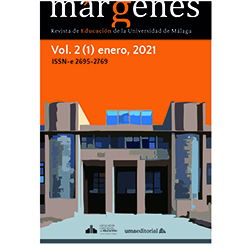Missing knowledge and knowledge to ignore in pedagogical field
DOI:
https://doi.org/10.24310/mgnmar.v2i1.9175Keywords:
pedagogical knowledge, desire to know, teacher education, emancipationAbstract
This essay explores knowledge as a product of alteration and an effect on subjectivation modes. Under the reference to the Pandora’s Greek myth, the desire to know is reflected, from the preontological curiosity that is installed as an unresolved question throughout life. Similarly, the Psyche’s myth addresses the need for the stripping of educational prerogatives. Emphasis is placed on unfinished pedagogical knowledge. Language, conversation and study are pretexts that set in motion the search -freedom of meaning- for existence in its own time. The knowledge relationship requires recognition, above the content and learning guides. Therefore, the need arises for teachers to accept some knowledge and detach themselves from others. Thus, the knowledge from the internal world of educators may be captured by prediction, which translates into apathy and disinterest in students. In order for the teacher to be available to them and to trigger and sustain the function of knowledge, generosity in offering cultural resources and omitting the logic of representation are required. Elements that encourage the teacher to promote the emancipation of their students from the affirmation of their capacities and powers, from the trust and with the consent of the other.
Downloads
Metrics
Publication Facts
Reviewer profiles N/A
Author statements
Indexed in
-
—
- Academic society
- N/A
- Publisher
- Universidad de Málaga
References
Alliaud, A. & Antelo, E. (2011). Los gajes del oficio. Aique.
Arbiol, C. (2018). Elementos para una pedagogía de la alteridad en la práctica de educadoras sociales.
Teoría de la educación, 30(2), 109-129.
Arendt, H. (2016). Entre el pasado y el futuro. Península.
Beillerot, J. (1996). Pour une clinique du rapport au savoir. L’Harmattant.
Biesta, G. (2017). El bello riesgo de educar. SM.
Butler, J. (2017). Marcos de guerra. Las vidas lloradas. Paidós.
Bárcena, F. & Mèlich, J-C. (2014). La educación como acontecimiento ético. Miño y Dávila.
Bárcena, F. (2012). El aprendiz eterno. Miño y Dávila.
Castoriadis, C. (2006). Sujet et vérité. Seuil.
Charlot, B. (1997). Du rapport au savoir. Economica.
Deligny, F. (2009). Permitir, trazar, ver. MACBA.
Derrida, J. (1998). Políticas de la amistad. Trotta.
Enriquez, E. (2015). Clinique du pouvoir. Eres.
Filloux, J-C. (2001). Campo Pedagógico y Psicoanálisis. Nueva Visión.
Freud, S. (2013). Obras completas: Fragmento de análisis de un caso de histeria (Dora). Tres ensayos de teoría
sexual, y otras obras, 1901-1905. Amorrortu.
Frigerio, G. & Diker, G. (Ed.) (2006). Educar: ese acto político. Del Estante.
Frigerio, G., Korinfeld, D., & Rodríguez, C. (2017). Trabajar en instituciones: los oficios del lazo. Noveduc.
Garcés, M. (2017). Nueva ilustración radical. Anagrama.
Gribinski, M. (2011). Les Scènes indésirables. De l’Olivier.
Guignard, F. (2013). En el núcleo vivo de lo infantil en el adulto. Biblioteca Nueva.
Hassoun, J. (1996). Los contrabandistas de la memoria. De la Flor.
Kaplan, A. & Sanmartín, M. (2017). Niños dispersos, aburridos, solos. Noveduc.
Lacan, J. (1997). Seminario 17. El reverso del psicoanálisis. Paidós.
Lacan, J. (2014). Seminario 6. El deseo y su interpretación. Paidós.
Larrosa, J. (2017). Pedagogía profana. Miño y Dávila.
Lazzarato, M. (2006). Por una política menor. Traficantes de sueños.
Lévinas, E. (2012). Totalidad e infinito. Sígueme.
Mannoni, O. (1989). La educación imposible. Siglo XXI.
Mauco, G. (1993). Psicoanálisis y educación. Carlos Lohlé.
Meirieu, P. (2019). Pedagogía: necesidad de resistir. Popular.
Mèlich, J-C. (2015). Ética de la compasión. Herder.
Niedzwiecki, D. (Ed.) (2015). Solá, fané y descangayada: conversaciones sobre la escuela. FLACSO.
Nietzsche, F. (2015). Humano, demasiado humano. Edaf.
Percia, M. (2017). Estancias en común. La Cebra.
Philips, A. (2014). La meilleure des vies. De l’Olivier.
Rabant, C. (2008). Deseo de saber y campo pedagógico. En Jiménez, M. & Páez, R. (Eds.) Deseo, saber y transferencia (pp.239-290). Siglo XXI.
Rancière, J. (2010). El maestro ignorante. Laertes. Recalcati, M. (2016). La hora de clase. Anagrama. Ricoeur, P. (2010). Sí mismo como otro. Siglo XXI. Ricoeur, P. (2013). Caminos del reconocimiento. Trotta. Skliar, C. (2017). Pedagogías de las diferencias. Noveduc. Soler, C. (2015). Lo que queda de la infancia. Letra Viva.
Stavchansky, L. & Untoiglich, G. (2017). Infancias. Entre espectros y trastornos. Paradiso Editores.
Viñar, M. (2014). Notas sobre la juventud hoy. InterCambios: Dilemas y Transiciones de la Educación Superior, 1, 1, pp. 20-27.
Winnicott, D. (2008). Realidad y juego. Gedisa. Zizek, S. (2017). Porque no saben lo que hacen. Akal.
Downloads
Published
How to Cite
Issue
Section
License
The editorial team of Márgenes supports an open Access policy of scientific knowledge. apostamos claramente por una política de acceso abierto del conocimiento científico (see Berlin Declaration).
Authors with work published in this journal accept the following conditions:
- This journal provides immediate free access to its content under the principle of making research freely available to the public. All contents published in Márgenes are subject to the Creative Commons Reconocimiento-SinObraDerivada 4.0 Internacional
It is the responsibility of the authors to obtain the necessary permissions of the images that are subject to copyright.
Authors whose contributions are accepted for publication in this journal will retain the non-exclusive right to use their contributions for academic, research and educational purposes, including self-archiving or deposit in open-access repositories of any kind.
The electronic edition of this magazine is edited by the Editorial of the University of Malaga (UmaEditorial), being necessary to cite the origin in any partial or total reproduction.
- Authors can enter into other additional independent contractual agreements for the non-exclusive distribution of the version of the article published in this journal (e.g. including it in an institutional repository or publishing it in a book) on the condition that they clearly indicate that the work was originally published in this journal.
- Authors are allowed and recommended to publish their work on the Internet (for example on institutional and personal websites), before and after the publication, as this could lead to constructive exchanges and a more extensive and quick circulation of published works (see The Effect of Open Access).















